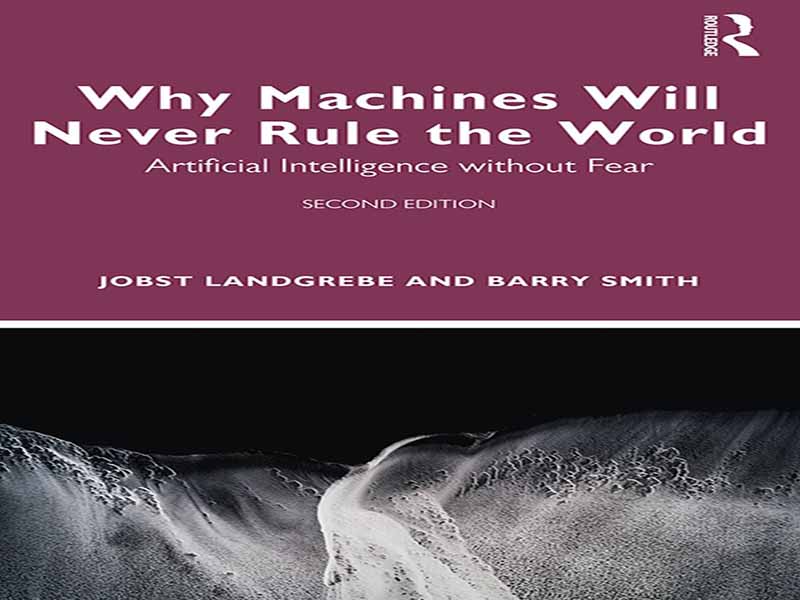- عنوان کتاب: Why Machines Will Never Rule the World -Artificial Intelligence without Fear
- نویسنده: Jobst Landgrebe, Barry Smith
- حوزه: کاربرد هوش مصنوعی
- سال انتشار: 2025
- تعداد صفحه: 680
- زبان اصلی: انگلیسی
- نوع فایل: pdf
- حجم فایل: 5.59 مگابایت
این کتاب درباره هوش مصنوعی (AI) است که ما آن را به عنوان کاربرد ریاضیات در مدلسازی (عمدتاً) عملکردهای مغز انسان در نظر میگیریم. ما به طور خاص بر این سوال تمرکز میکنیم که آیا مدلسازی از این نوع محدودیتهایی دارد، یا اینکه – همانطور که توسط طرفداران آنچه «تکینگی» نامیده میشود، مطرح شده است – مدلسازی هوش مصنوعی ممکن است روزی منجر به انفجار برگشتناپذیر و غیرقابل کنترل ماشینهای همیشه هوشمند شود. در مورد وضعیت فعلی هنر، محققان هوش مصنوعی، به دلایل قابل فهم، به شدت به اکتشافات فنی شگفتانگیز خود افتخار میکنند. بنابراین برای همه واضح به نظر میرسد که پتانسیل تقریباً بیحد و حصری برای اکتشافات بیشتر و به همان اندازه مهم هوش مصنوعی در آینده وجود دارد. بر این اساس، بودجههای هنگفتی برای پیشبرد مرزهای هوش مصنوعی در تحقیقات پزشکی، دفاع ملی و بسیاری از زمینههای دیگر سرمایهگذاری میشود. اگر استدلالهای ما درست باشد، بخش قابل توجهی از این بودجه ممکن است هدر رود. تنها به همین دلیل، احتمالاً بد نیست که فرض پتانسیل بیحد و حصر برای پیشرفت هوش مصنوعی تحت بررسی انتقادی قرار گیرد که ما در اینجا تلاش کردهایم. باید اعتراف کنیم که نتیجه همیشه خواندنی نیست. برای انجام صحیح کارمان، لازم دانستیم که تا حد زیادی از مرزهای معمول رشتهای فراتر برویم و نه تنها از فلسفه، ریاضیات و علوم کامپیوتر، بلکه از زبانشناسی، روانشناسی، انسانشناسی، جامعهشناسی، فیزیک و زیستشناسی نیز بهره ببریم. در بخش «رویکرد» مقدمه، منطق این روششناسی و در صورت نیاز، انتخاب ادبیات خود را ارائه میدهیم. در «واژهنامه» (صفحات ۳۵۲ به بعد)، آنچه را که امیدواریم تعاریف خوانندهپسند از اصطلاحات فنی مورد استفاده در متن اصلی باشد، ارائه میدهیم. ما آنچه را که معتقدیم استدلالهای قدرتمندی علیه امکان مهندسی ماشینهایی است که دارای هوشی برابر یا برتر از انسان باشند، مطرح میکنیم. این استدلالها پیامدهای فوری برای ادعاهایی مانند ادعاهای ایلان ماسک دارند که طبق آن هوش مصنوعی میتواند به «یک دیکتاتور جاودانه تبدیل شود که هرگز از آن فرار نخواهیم کرد». آرام باشید. ماشینها بر جهان حکومت نخواهند کرد. در عین حال، استدلالهای ما این سوال را روشن میکند که کدام انواع هوش مصنوعی قابل دستیابی هستند. از این نظر ما بسیار خوشبین هستیم و یکی از ما در حال حاضر در حال کمک به ایجاد محصولات جدید هوش مصنوعی است که همزمان با نگارش این کتاب در صنعت به کار گرفته میشوند. در فصل آخر کتاب، برخی از پیامدهای مثبت استدلالهایمان برای کاربردهای عملی هوش مصنوعی در آینده را شرح میدهیم.
This book is about artificial intelligence (AI), which we conceive as the application of mathematics to the modelling (primarily) of the functions of the human brain. We focus specifically on the question of whether modelling of this sort has limits, or whether – as proposed by the advocates of what is called the ‘Singularity’ – AI modelling might one day lead to an irreversible and uncontrollable explosion of evermore intelligent machines. As concerns the current state of the art, AI researchers are, for understandable reasons, immensely proud of their amazing technical discoveries. It therefore seems obvious to all that there is an almost limitless potential for further, equally significant AI discoveries in the future. Enormous amounts of funding are accordingly being invested in advancing the frontiers of AI in medical research, national defence, and many other areas. If our arguments hold water, then a significant fraction of this funding may be money down the drain. For this reason alone, it is probably no bad thing for the assumption of limitless potential for AI progress to be subjected to the sort of critical examination that we have here attempted. The result, we must confess, is not always easy reading. To do our job properly, we found it necessary to move to a rather drastic degree beyond the usual disciplinary borders, drawing not merely on philosophy, mathematics, and computer science but also on linguistics, psychology, anthropology, sociology, physics, and biology. In the ‘Approach’ section of the Introduction, we provide the rationale for this methodology and, where this is needed, for our choice of literature. In the ‘Glossary’ (pp. 352ff.), we provide what we hope are reader-friendly definitions of the technical terms used in the main text. We raise what we believe are powerful arguments against the possibility of engineering machines that would possess an intelligence that would equal or surpass that of humans. These arguments have immediate implications for claims, such as those of Elon Musk, according to which AI could become ‘an immortal dictator from which we would never escape’. Relax. Machines will not rule the world. At the same time, our arguments throw light on the question of which varieties of AI are achievable. In this respect we are fervent optimists, and one of us is indeed contributing to the creation of new AI products being applied in industry as this book is being written. In the final chapter of the book, we outline some of the positive consequences of our arguments for practical applications of AI in the future.
این کتاب را میتوانید از لینک زیر بصورت رایگان دانلود کنید:
Download: Why Machines Will Never Rule the World -Artificial Intelligence without Fear



































نظرات کاربران